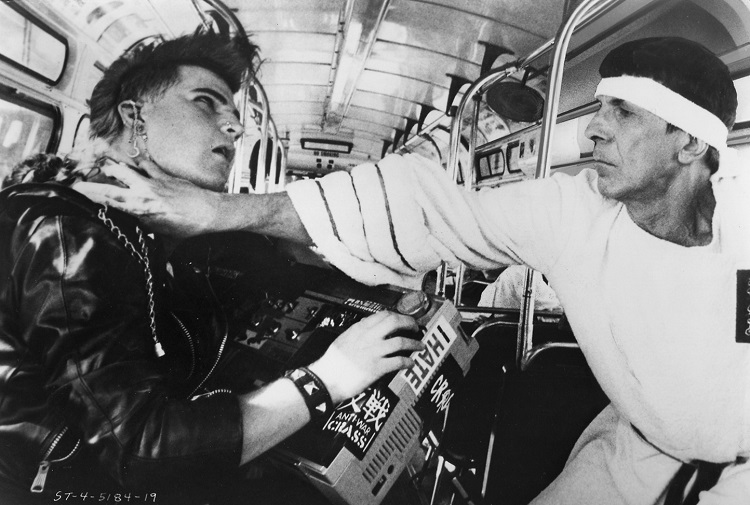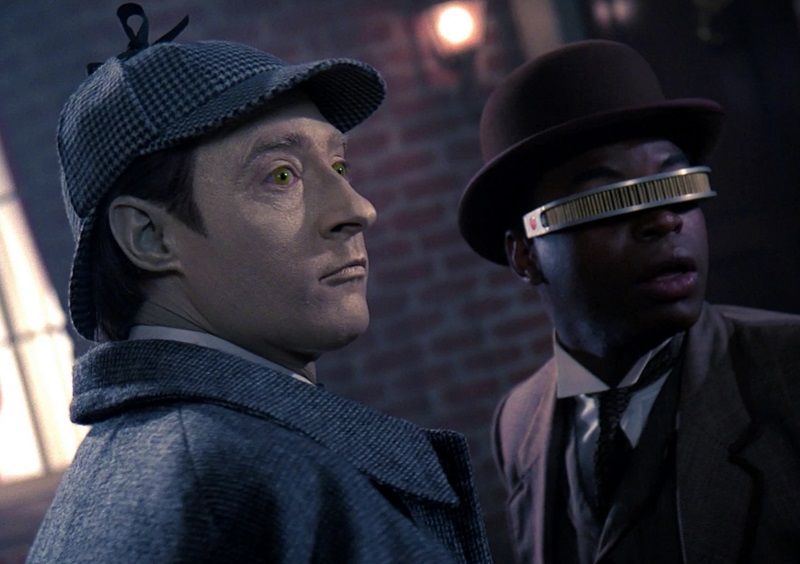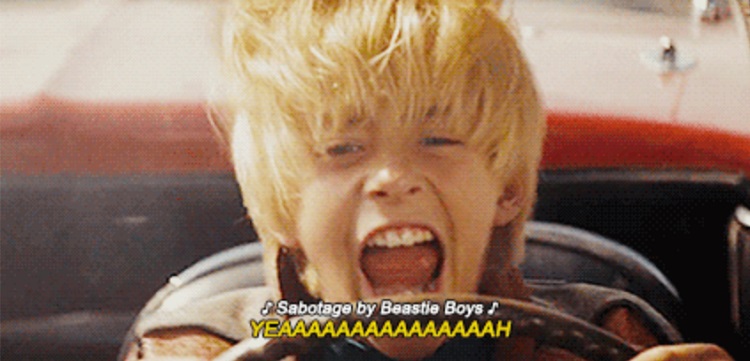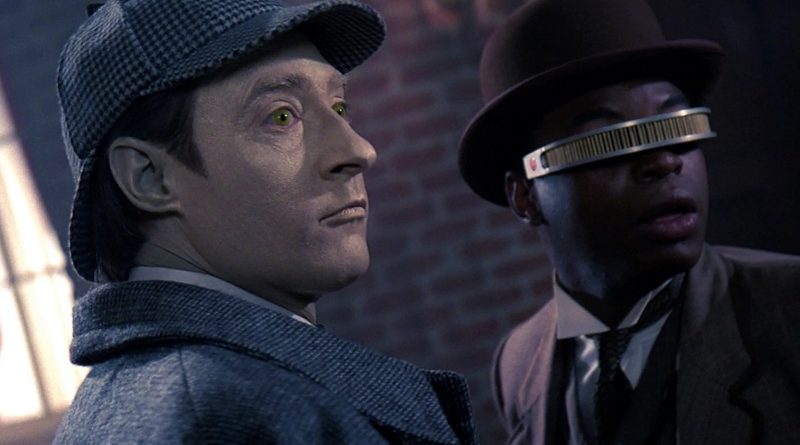Three Times Star Trek Met Pop Culture
by Audrey Brown
Star Trek’s distant fictional future has the surprisingly frequent habit of crossing paths with pop culture. Every franchise had at least one crossover moment. Each instance told us something definitive about that ship, that captain, or the moment in time in which it was created.
They say, “Write what you know,” and because I mostly know Star Trek: The Original Series, Star Trek: The Next Generation and the Kelvin Timeline, I’m focusing on those. But I hope you’ll share your own examples from other series in the comments below.
Star Trek TOS meets all things 80’s
Star Trek: The Voyage Home sent the crew of the Enterprise back in time to 1986 to rescue humpback whales from extinction. The fish out of water story is easily the funniest, and most self-aware, of the original Trek films.
Most of the humor comes from the crew reacting to ancient technology. There is Scotty’s “Hello, computer?” scene, where he attempts to speak into a mouse. We also get to watch Bones reacting to a surgical procedure, “My God, man – drilling holes in his head’s not the answer. The artery must be repaired. Now put away your butcher knives and let me save this patient before it’s too late!”
My favorite example of the culture clash is the scene where Spock and Kirk encounter a punk on a bus listening to loud music. After politely asking him to turn it down repeatedly, you can probably guess how Spock literally handled the situation.
 Aside from all the fun, the plot itself offered a tiny little microcosm of our societal cares. Yes, it was still Star Trek in all its futuristic, adventurous trappings. There were phasers, communicators and transporters. But there was something else special about it. I want to offer some context so you can understand it if you weren’t around when the movie was released.
Aside from all the fun, the plot itself offered a tiny little microcosm of our societal cares. Yes, it was still Star Trek in all its futuristic, adventurous trappings. There were phasers, communicators and transporters. But there was something else special about it. I want to offer some context so you can understand it if you weren’t around when the movie was released.
The Eighties were also known for a handful of conservation campaigns. We were worried about the rainforest and the ozone layer. “Save the Whales” and “Save the Dolphins” were both popular sentiments and slogans. You could find them on t-shirts and pencils everywhere. But issue plots were typically relegated to very special episodes of television. For example, I’m thinking of the “Just Say No” episode of Punky Brewster.
Try to imagine an issue-centric Thanksgiving blockbuster getting released today. How about a Marvel movie where the Avengers have to save women’s healthcare? How about a Mission Impossible movie where Ethan Hunt has to steal proof of Russian collusion?
My point here is that The Voyage Home, even in its openly sentimental title, says so much about where we were as a society at the time, fairly united about what was right and wrong. We shared enough common concerns as a wide audience to get the same jokes. It was universally understood that saving whales from extinction would be a sympathetic quest for our heroes, one that garnered enough appeal across multiple demographics to make plenty of money over a holiday weekend.
And if it seems like I’m reading too much into things, you’re probably right. Here’s a bonus pop culture reference for your patience. In the movie, Kirk and Spock also attempt to use a lot of contemporary curse words. “Double dumb ass on you,” is my favorite.
Star Trek: The Next Generation and Sherlock Holmes
Next Gen had several brushes with pop culture across its seven year TV run and a few in their films. Picard was an avid Shakespeare fan, listened to opera, and enjoyed quite a few film noir adventures in the holodeck. Norman Greenbaum’s “Spirit in the Sky” played a pivotal role in First Contact.
A few crew members were drawn into the Wild West via holodeck and many more actually traveled back in time to the 1800’s, where they met a delightfully meddlesome Mark Twain. Data tried stand-up comedy, complete with Joe Piscopo cameo. And just like the rest of us, Riker liked to kick back and unwind with a bit of jazz trombone.
But none of those were quite as much fun as Data’s obsession with Sir Arthur Conan Doyle’s fictional detective, Sherlock Holmes. Data became fascinated with Holmes after hearing him referenced and basically… fangirled out forevermore. He cosplayed. He larped. He used the famed detective’s reasoning skills when on duty.
 If it’s true that we cosplay as characters we identify with and find aspirational, it makes perfect sense that Data would choose the perceptibly cold, fact-driven Holmes as a model of attainable humanity. Even with his emotion chip, Data could never be fully human. But he could relate to a human character created as driven, obsessive and consistent. In other words, Holmes captured Data’s fascination because he was robotic.
If it’s true that we cosplay as characters we identify with and find aspirational, it makes perfect sense that Data would choose the perceptibly cold, fact-driven Holmes as a model of attainable humanity. Even with his emotion chip, Data could never be fully human. But he could relate to a human character created as driven, obsessive and consistent. In other words, Holmes captured Data’s fascination because he was robotic.
Next Gen had a lot of room to move, story-wise. We can never truly say any time in our history is peaceful, but the late Eighties/early Nineties can seem peaceful in retrospect compared to now. Kirk’s ship and quest were created against the backdrop of the Sixties, and there are plenty of cultural nods to remind us of that when we watch of the show.
Picard was almost the anti-Kirk. He was the thinking man’s captain and Data was the thinking man’s sidekick. As I mentioned here, Next Gen was intentionally socially conscious, partly due to the fact that it accepted scripts as open submissions from fans.
It allowed for vast differences in point-of-view; it purposefully made points about human rights. It was heady and intellectual, as humans tend to be in times of peace. We’re far more likely to delve into historical literature when we’re not… oh, say… trying to survive from one day to the next. So the bevy of pop culture references in Next Gen, and the presence of Holmes in particular, make perfect sense for their time and place.
The Abramsverse/Kelvin Timeline and Beastie Boys
I was such a bitter Bonnie about Abrams’ Trek before it was released. I remember writing worried emails to friends and editors at the time, with long lists of my fears about the reboot. I performed the greatest hits. Songs such as, “How dare they recast these roles when the actors are still alive!” and, “Why can’t they just make new Star Trek?”
In the documentary Chaos on the Bridge, I learned that this type of aggressive reaction is, unfortunately, typical of fan reactions anytime new Star Trek is introduced. And as the great Australian philosopher Jacques the shrimp once said, “I am ashamed.” When I saw 2009’s Star Trek, I loved it. I loved it so much I saw it six times in the theater.
One thing that perfectly represented my fears, and why they were unfounded, was the use of the Beastie Boys song “Sabotage.” It was something innately awesome by itself; full of energy, and seemingly out of place in the Trek universe. In other words, it perfectly reflected everything the Kelvin Timeline would become.
 Looking back, “Sabotage” was a particularly relevant song choice for a few reasons. It perfectly represented Kirk’s character. Kirk isn’t just rebellious; he’s iconoclastic. It’s what makes his adventures as a captain exciting to watch.
Looking back, “Sabotage” was a particularly relevant song choice for a few reasons. It perfectly represented Kirk’s character. Kirk isn’t just rebellious; he’s iconoclastic. It’s what makes his adventures as a captain exciting to watch.
It was also kind of a statement. This may be the future, but it’s still a future Earth, a world where spaceships can fly but stepdads and stepsons still fight. It was a way of bringing a more grounded reality to an already established sci-fi property.
Including a Beastie Boys song so close to the start of the film was a cue that it was okay for us to have fun. The title of the song itself could even be read as a wink and a nudge to the fears of fans.
If rebooting Star Trek was the Kobayashi Maru, Abrams himself played Kirk. He found a way to subvert the whole thing. He succeeded without taking anything away. Because of that, I now find myself a constant defender of new things Trek. A member of the school of, “Watch it before you form an opinion.” A fan.
~
How Star Trek: Discovery will touch our pop culture present is anyone’s guess. Watching it unfold? That will probably be everyone’s delight. And because my writing is slowly starting to slip into the overly verbose, not-so-dulcet tones of Futurama’s Hedonism-bot, I think now is a good time to bring this article to a close with a good, old-fashioned, Live long and prosper.”
Audrey (in her super-secret third-person) began writing professionally in 2007. She has her MA in creative writing and has sold two screenplays. Her work has appeared in magazines like Geek Monthly, on-air via public radio, and onscreen at the Los Angeles Comedy Festival. You can find her at AudreyWrites.com, BornForGeekdom.net and Twitter.
- How To Ride Rise of the Resistance - January 28, 2020
- Terrio and Rejwan Talk The Rise of Skywalker - December 23, 2019
- Star Tours Updated For The Rise of Skywalker - December 21, 2019











